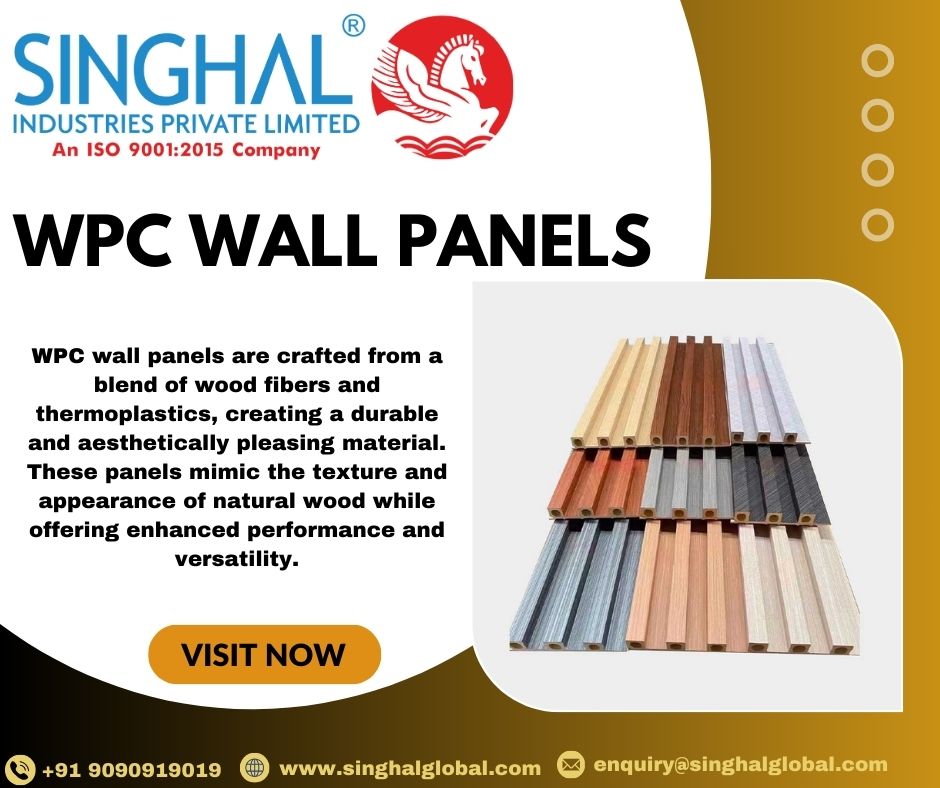Why WPC Wall Panels Are the Future of Sustainable Design

As the world becomes increasingly conscious of environmental impacts, the demand for sustainable building materials has surged. Wood-Plastic Composite (WPC) wall panels have emerged as a leading solution in this green revolution, blending sustainability with innovation to redefine modern design. In this article, we will explore why WPC wall panels are poised to become the cornerstone of sustainable design, addressing their benefits, applications, and frequently asked questions. Additionally, we’ll provide insights into sourcing WPC panels in India, particularly focusing on suppliers such as Singhal Industries.
What Are WPC Wall Panels?
WPC wall panels are an advanced building material made from a composite of wood fibers and plastic. This combination creates a product that combines the aesthetic appeal of natural wood with the resilience and durability of plastic. The result is a material that is not only visually appealing but also highly functional and sustainable.
Benefits of WPC Wall Panels
1. Environmental Sustainability
One of the primary advantages of WPC wall panels is their environmental sustainability. WPC panels are made from recycled materials, including wood fibers and plastic. By repurposing these materials, WPC panels help reduce waste and the consumption of virgin resources. This process lessens the environmental impact associated with traditional wood and plastic production, making WPC panels a greener alternative.
2. Durability and Longevity
WPC panels are designed to withstand harsh environmental conditions. Unlike traditional wood, WPC panels are resistant to water, termites, and decay. This durability ensures a longer lifespan, reducing the need for frequent replacements and repairs. Consequently, this durability contributes to a lower overall environmental footprint over the material’s lifecycle.
3. Low Maintenance Requirements
Another key benefit of WPC panels is their low maintenance needs. Traditional wood requires regular sealing, painting, and treatment to maintain its appearance and integrity. In contrast, WPC panels are resistant to stains and require only occasional cleaning with mild soap and water. This ease of maintenance not only saves time and money but also minimizes the use of harsh chemicals.
4. Aesthetic Versatility
WPC wall panels are available in a wide range of colors, textures, and finishes, making them highly versatile in design. Whether you’re looking for the classic look of wood or a more contemporary finish, WPC panels can be customized to meet diverse design preferences. This versatility allows designers to achieve a variety of looks while benefiting from the material’s practical attributes.
5. Energy Efficiency
The insulating properties of WPC panels can contribute to a building’s overall energy efficiency. By providing additional insulation, WPC panels help regulate indoor temperatures, reducing the reliance on heating and cooling systems. This can lead to lower energy consumption and reduced utility bills, making WPC panels an eco-friendly choice that also offers financial benefits.
Applications of WPC Wall Panels
Interior Walls
WPC panels are increasingly being used for interior walls in both residential and commercial settings. Their ability to mimic the look of natural wood while providing enhanced durability makes them ideal for living rooms, offices, kitchens, and bathrooms. The ease of installation and maintenance further adds to their appeal for interior applications.
Exterior Walls
For exterior applications, WPC panels offer several advantages over traditional cladding materials. Their resistance to weather conditions such as rain, UV exposure, and temperature fluctuations makes them suitable for outdoor use. This durability ensures that the panels maintain their appearance and functionality over time, contributing to a building’s long-term sustainability.
Sourcing WPC Wall Panels in India
When it comes to sourcing high-quality WPC wall panels in India, it’s essential to choose reputable suppliers who offer reliable products and services. For those in search of WPC panels, Singhal Industries stands out as a prominent Wall Panel WPC Supplier in Ahmedabad. They provide a diverse range of WPC panels suited for various applications, from residential interiors to commercial exteriors.
Wall WPC Panel Price
The Wpc Panel Wall Price can vary based on factors such as quality, design, and size. Generally, WPC panels are competitively priced compared to other high-end materials, considering their durability and low maintenance requirements. It is advisable to obtain quotes from multiple suppliers to ensure you receive the best value for your investment.
Conclusion
WPC wall panels represent a significant advancement in sustainable design, combining the aesthetic appeal of wood with the durability and functionality of plastic. Their environmental benefits, low maintenance requirements, and versatile applications make them a forward-thinking choice for both interior and exterior projects. As the demand for sustainable building materials continues to grow, WPC panels are well-positioned to lead the way in eco-friendly design solutions. For those seeking high-quality WPC panels in India, Singhal Industries offers a reliable source, ensuring you get the best products to meet your design and sustainability goals. By choosing Wall Wpc Panel Supplier in India , you are not only enhancing the aesthetic and functional aspects of your space but also contributing to a more sustainable future.
Frequently Asked Questions (FAQ)
1. What makes WPC wall panels a sustainable choice?
WPC wall panels are considered sustainable because they are made from recycled wood fibers and plastic, reducing waste and the need for new resources. Their durability and low maintenance requirements also contribute to a lower overall environmental impact.
2. Are WPC wall panels suitable for both interior and exterior applications?
Yes, WPC wall panels are versatile and can be used for both interior and exterior applications. They offer excellent resistance to moisture and weather conditions, making them suitable for a variety of settings.
3. How do WPC panels compare to traditional wood panels?
WPC panels offer similar aesthetic qualities to wood but with enhanced durability and lower maintenance. Unlike traditional wood, they are resistant to water, pests, and decay, making them a more practical and long-lasting choice.
4. How do I maintain WPC wall panels?
WPC wall panels require minimal maintenance. Regular cleaning with mild soap and water is usually sufficient to keep them looking their best. They do not need regular sealing or painting, unlike traditional wood.
5. What factors influence the price of WPC wall panels?
The price of WPC wall panels can be influenced by factors such as panel quality, design, and size. Higher-quality panels and custom designs may cost more. It is advisable to compare prices from different suppliers to find the best deal.
6. Where can I find reliable WPC wall panel suppliers in India?
For those in India, Singhal Industries is a notable wall panel WPC supplier in Ahmedabad. They offer a wide range of WPC panels and are known for their quality products and customer service.
7. Can WPC panels be painted or stained?
While WPC panels come in a variety of finishes and colors, they generally do not require painting or staining. However, some manufacturers may offer options for custom finishes if desired.



